Listening Report: April 2012
← The Guilded Earlobe interviews Mainak Dhar about "Zombiestan"Release Week: Last Dragon by J.M. McDermott, Enchanted by Alethea Kontis, and more →
Listening Report: April 2012
Posted on 2012-05-03 at 19:52 by Sam
Last month it was 6 audiobooks, heavily slanted in favor of sf over fantasy. This month it’s back up to 9 audiobooks, with a pretty even split between genres, and some non-speculative (or at least not heavily speculative) stuff in the mix as well.
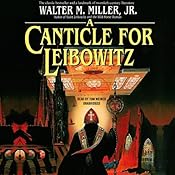


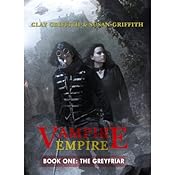
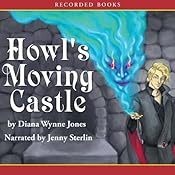
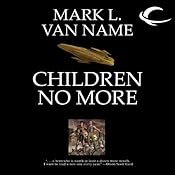

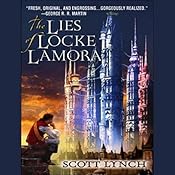
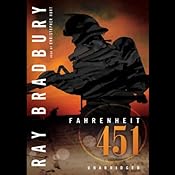
REVIEWS:
- A Canticle for Leibowitz By Narrated by (2011) for Blackstone Audio (review copy) — One of my all-time favorite novels, read very well. As many times as I’ve read the book, every re-reading brings something new, and this first listening certainly does the same. From part 1’s fasting, hermits, discovery, illumination, and travel (and “Eat! Eat!”); to part 2’s shambling re-emergence of technology, a time period explored much further and beautifully in the book’s sequel, Saint Leibowitz and the Wild Horse Woman, by the way; to part 3’s closing the circle of cyclical flame deluge, complete with two-headed prophets, it’s a novel of glimmering prose and crystalline insight into the fears of the Cold War.
- Galapagos By Narrated by
- The Silence of Trees by Valya Dudycz Lupescu (2010), Narrated by Xe Sands (2012) for Iambik Audiobooks — I discovered this book via Literate Housewife’s Listen-A-Long campaign on her blog, and while I’m quite glad that I did — Sands’s nuanced and emotional reading; Ukrainian history and folklore; inhabiting the familiar neighborhoods of Chicago — it was not quite the novel I expected. It’s labeled as sf in Iambik’s catalog, with some magical realism overtones, but the novel reads for me quite perfectly well as mimetic fiction, with some dreams, stress-induced hallucinations, and (perhaps) age-related dementia creeping in the corners late in the book. It’s a wonderful, painful, lovely portrait of an elderly Ukrainian woman, reflecting back upon a long life filled with death, hardships, loves, and (most of all) family, the traditions, the painful past.
- Vampire Empire - The Greyfriar By Narrated by Princess Adele’s airship is attacked in force by vampires intent on her capture. Adele is combat trained and able, though when things look their bleakest… enter The Greyfriar, fast, skilled, strong, and tireless enough to match swords with vampire claws and spirit Adele into the French countryside. So: we have a kind of “Steampunked” alternate future of airships and goggles; we have deadly, amoral vampires and The Greyfriar; and we have the rise of a decidedly fantastic element, of mystical arts, amidst the rising tides of all-out war, circling around a badass and capably armed princess. All narrated wonderfully by Marsters, no stranger to vampires to say the least. Best known in audio as the long-standing voice of Jim Butcher’s Harry Dresden, he’s absolutely landed on his feet in a role absolutely perfect for him, and one which allows him to display a range of accents, ages, genders, and give voice to breathtaking derring-do. This one’s enthusiastically recommended.
- Howl’s Moving Castle By Narrated by
- Children No More: Jon & Lobo, Book 4 By Narrated by Series: Jon and Lobo, Book 4 — Very recommended sf here, though not without a couple potential missteps in pacing and over explanation of decisions. Our sentient high tech spaceship doesn’t get too many chances to show off in terms of firepower and ship to ship combat — but with all of Lobo’s sarcasm, and a demonstration of his/its abilities as hacker, surveillance, and command and control. This is a novel which ruminates on the costs of violence and very much in particular on the psychological damage done to child soldiers; the whiz-bang fireworks of space opera or military sf are a bit on pause. It’s a 2010 novel which has been tragically overlooked; it was not on the Locus recommended reading list, not in the Hugo long tail (results PDF here) — there’s quite a quiet something to this novel and I encourage more people to give the book a try. And the previous books in the series are not required reading to jump into Children No More, if my experience here is any indication. I really enjoyed getting to know Jon Moore through the use of the alternating origin story chapters; as the adult Moore finds himself trying to help former child soldiers make some sense of their lives, he is reliving his own, violent, militarized childhood in dreams and flashbacks. (Before I get to the conclusion, I want to say another word about the “over explanation” comment; it is actually for this reason (among several others which are more obvious) that Children No More is very recommended for fans of Ender’s Game; in that novel, we see Ender Wiggin work consequences out in detail in his head, and here there’s a similar use of Jon-Lobo interaction to present the full extent of the thought process behind decisions. OK, back to the book.) In Children No More, super-soldier Jon Moore is called upon to do something fairly extraordinary: not fight. To stay around and deal with the political aftermath of a military engagement, to protect something he cares about rather than destroy or acquire a target. To fulfill this particular mission, Jon (and Lobo of course!) have to devise a hacked-together high stakes plan to out-politic, out-bluff, out-media their opponents. When these overtly hidden plans come to fruition, I got big grin right along with Jon. In conclusion, though, I wonder if Van Name has written Jon into a non-violent corner; he’s learned a lot and grown during this book, which is saying something. I suppose we’ll find out pretty soon in the next book, No Going Back, at the end of May.
- The Mongoliad: The Foreworld Saga, Book 1 By Narrated by for Brilliance Audio (review copy) — Daniels’s performance is a tour de force across a mind-bogglingly diverse cast of character voices, though he handles the men better than he does the women. A dozen different European accents, along with Russian, Chinese, Mongolian, Japanese… It’s a meticulously researched historical novel of the expansion of the Mongolian Empire after the death of Genghis Khan, with the chief fictional element being an international A-team of monastic shield-brethren ranging from Spanish horseman to knights in full plate to Hungarian archers, banding together for an improbable mission: assassinate the Khan of Khans. Meanwhile, intrigue clouds the court of said Ogedai Khan as the ruler spirals into drink and despair surrounding the death of his younger brother. The first installment here sets the stage for book two later this year, and also contains quite a gladiatorial duel, choreographed out in detail, at the midpoint of the novel. Note: If there’s fantasy elements here, they are slight.
- The Lies of Locke Lamora By Narrated by Series: Gentleman Bastard Sequence, Book 1 — Wicked brilliant. Amazingly narrated. I can definitely see why this book comes up again and again in “what fantasy should I have read in the past few years” discussions. Nominated for a World Fantasy Award? 2nd place in the Locus poll for first novel? (How many first novels are nominated for the World Fantasy Award? Daryl Gregory’s Pandemonium and James Enge’s Blood of Ambrose in recent memory, as well as Hal Duncan’s Vellum and Susanna Clarke’s Jonathan Strange & Mr Norrell, and two novels in 2004 (Jeff VanderMeer’s Veniss Underground and KJ Bishop’s The Etched City), Steven Erikson’s Gardens of the Moon, Vikram Chandra’s Red Earth and Pouring Rain, Brooke Stevens’s The Circus of the Earth and the Air, and probably more I missed and that’s just since 1995, so maybe it’s not ALL that rare. One per year? They’re all (that I’ve read) excellent novels, so maybe I have a new search algorithm for “what book to read next…”) In any case, back to the review. Locke Lamora is sold as a precocious youth into the service of a particularly strange priest, who teaches Locke and his young friends the finer arts of grift. The primary thrust of the novel is a particularly incredible scheme of Locke’s, set against the rising tensions of a city under siege by a mysterious figure. I really don’t want to give much of anything of the plot away, but there are brilliant twists and turns, hilarious banter, and it’s all captured marvelously by Page. I’d actually held off listening to this due to some negative reviews of Page’s performance on the post-First Law books by Joe Abercrombie, but now I’m eager to take a closer look at those, as well as book two of The Gentlemen Bastards.
- Fahrenheit 451 By Narrated by ond dedication to Don Congdon, Bradbury’s agent; and a really nice extensive afterward with info from the stage play and Bradbury’s writing process: typing on a dime an hour rental at the UCLA library. Hurt’s narration plays it a little too straight laced for me but is fine and clear. A dystopian classic for obvious reasons, it does stand below 1Q84 for me, though it’s right up there with Huxley’s Brave New World. Quote of a quote: “It is computed that eleven thousand persons have at several times suffered death rather than submit to break their eggs at the smaller end.” (Including this one for “April” is a bit of a cheat; listened on May 1-2 but finished before writing the monthly wrapup, so…)
I also took advantage of the free sample chapters subfeature of Audible’s “Audiobook Tournament” bracket to get a good sample of Stephen King’s 11-22-63, Tea Obreht’s The Tiger’s Wife, the new Audible production of Stanislaw Lem’s Solaris, and Lauren Oliver’s well-received YA novel Delirium. None of them convinced me yet to go for a full purchase, which says something perhaps about the promotion, though I’m not yet sure what.
PLANS for MAY:
- Giant Thief: Tales of Easie Damasco, Book 1 By Narrated by
- Shadow’s Son by Jon Sprunk, performed by a full cast for GraphicAudio — I was all set to order directly, until I saw that the shipping charge for 1 CD was $7… So I’m starting to poke on local bookstores to see who will order it for me; if there’s no dice there, I’ll give the MP3 download a try.
- The Amazing Adventures of Kavalier and Clay by Michael Chabon (Brilliance Audio, May 5) — finally an unabridged recording of this book! Next up, please bring us The Yiddish Policeman’s Union…
- YA/YR: Railsea by China Mieville (Del Rey, May 15, 2012) — moletrains and moldywarpe hunts — “a novel for readers of all ages, a gripping and brilliantly imagined take on Herman Melville’s Moby-Dick”
- 2312 by Kim Stanley Robinson (Orbit, May 22, 2012) — “The year is 2312. Scientific and technological advances have opened gateways to an extraordinary future. Earth is no longer humanity’s only home; new habitats have been created throughout the solar system on moons, planets, and in between. But in this year, 2312, a sequence of events will force humanity to confront its past, its present, and its future.” I’ve heard fantastic things about this book. KSR interplanetary worldbuilding and great characters? Tick tick tick, end of May. Tick tick tick.
- YR: The Prince Who Fell from the Sky by John Claude Bemis (Random House Books for Young Readers, May 22, 2012) — no audio news, so I am leaning toward reading this with my kids as I’ve done for the past few YR books we’ve enjoyed (Hugo, Windblowne, The Death of Yorik Mortwell).
- No Going Back (Jon & Lobo Series) by Mark L. Van Name (Baen, print and e-book), read by Tom Schechschulte (Audible Frontiers) — speaking of the end of May; May 29, so probably this will have to wait until June.
- Into the Black by Evan Currie, performed by Benjamin L. Darcie for Brilliance Audio — have it on review copy and will at least be peeking in sometime this month
- Blackbirds by Chuck Wendig along with White Horse by Alex Adams are two books I keep getting recommendations for; given time… not to mention all the books I’ve had to pass up so far this year that I have my eye on getting back to: The Rook; The Flame Alphabet; Immobility; Angelmaker; Range of Ghosts;tons of Michael Swanwick; Mechanique; Enter, Night; The Scar; Ken MacLeod’s Fall Revolution series; Zombiestan (thanks to The Guilded Earlobe’s interview and review); and more tons of audiobooks missed in 2011 from newly produced classics like Stand on Zanzibar to Swamplandia! to …
